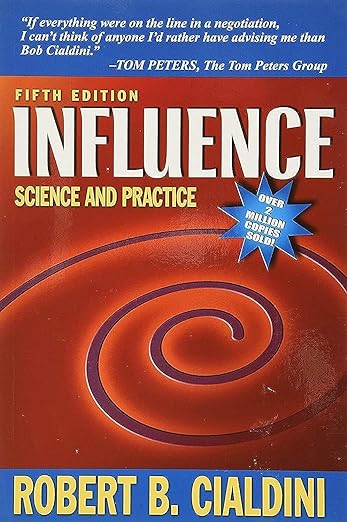Psychology of Influencing People

I read "Influence: Science and Practice" because I wanted to learn about the psychological intuition that when someone does something, people think a certain way. The book introduces various psychological techniques that are prevalent in the world.
The Principle of Contrast
The same thing can feel completely different depending on what happened before it.
Example: Men's Clothing Store
The salesperson first tries to sell a suit, which is expensive and makes customers hesitant. Then, when they show a sweater next, it doesn't seem as costly. The same principle applies to shirts, shoes, belts, etc.
Example: Real Estate
After showing several terrible houses, a moderately good house looks impressive.
Reciprocity
When someone does us a favor, we feel obligated to return it. This rule is widely accepted in all human societies. People with a debt will return the favor, regardless of their liking for the person.
Just a small act of kindness by a salesperson before making a request can significantly increase the chances of the request being accepted. Free samples are effective in letting people know the quality of the product and invoke the rule of reciprocity. The same goes for supermarket samples.
Why do we feel obliged to return the favor?
→ Because people who only receive kindness and do not reciprocate are disliked by their social group.
This obligation creates psychological discomfort and the risk of being viewed negatively by others.
Compromise
We feel obligated to compromise with someone who has compromised for us. The psychology of thinking, "Since I refused XX, I should at least do YY."
Example:
Would you buy a ticket? (If refused) How about a chocolate bar?
Refusing first and then compromising is a very effective technique.
→ Door-In-The-Face Technique
First making a big request and then lowering it to a smaller one increases the chances more than just making the small request.
Surprisingly, using the "refusal then compromise" method not only gets the other person to agree to our request but also to actually carry it out and be open to further requests.
This results in a sense of responsibility and satisfaction for the agreement, often leading the other person to view it positively.
Commitment and Consistency
Once a decision is made or a position is declared, there is pressure, both internally and externally, to behave consistently with that commitment.
Example:
Asking over the phone if someone would like to volunteer.
Not wanting to be seen as cold-hearted, they agree.
Once said, there's a psychological need to follow through.
→ As a result, the participation rate increased eightfold by contacting in advance.
First get a small request accepted, then relate it to a larger request.
→ Foot-In-The-Door Technique
What's important is to use reasons that make the person feel like they willingly chose the desired behavior.
→ Lowball Technique
Example:
First quote a low price to engage the customer, then let them make a choice. Once they trust the salesperson, they tend to accept even if the price increases, thinking it's their own decision.
Social Proof
In certain situations, the more people who perform a certain action, the more correct it seems.
Example:
Creating a long line outside a store by limiting entry, even though there's plenty of space inside.
Only about 5% of people can decide what to buy on their own; the remaining 95% imitate others.
When wondering how to behave, the most helpful reference is the behavior of others similar to oneself.
Liking
People tend to say yes to acquaintances they like.
If a customer says they like an item, ask them to refer a friend who would be interested in the same item. Saying "XX asked me to visit you" makes it harder to turn away a salesman.
People tend to like salespeople from their hometown or with whom they have some familiarity.
Friend referral campaigns are probably based on this principle.
Authority
People are weak against authority. They take whatever experts (doctors, judges, professors, etc.) say at face value. Titles and clothing are unconsciously used as indicators of expertise.
Milgram's Experiment
An experiment where the "teacher" increases the voltage each time the "learner" makes a mistake. In reality, the "learner" was an actor, and the electric current was a bluff.
The "learner" would thrash in pain, begging "Stop, I'll die!" but the test was to see how far the "teacher" would go.
→ Most people completed the task despite the learner's protests.
Why didn't they stop the experiment?
→ Because a "boss" (researcher in a lab coat) was behind the teacher.
Actually, the teachers were begging to stop and let the learner go, but the researcher consistently refused.
Almost no one defied the researcher and stopped the experiment.
The main finding of this study is that people tend to obey orders from an authority figure.
Scarcity
When something becomes hard to obtain, it seems more valuable.
Example 1:
Special sales at electronics stores.
People believe they will miss the chance if they don't buy now (even though sales are often ongoing).
Example 2:
A presentation experiment.
1: Standard sales presentation
2: In addition to 1, information that imports will decrease in the coming months
3: In addition to 2, mention that this information is exclusive and obtained independently
→ As a result, people who heard 2 ordered twice as much as 1, and those who heard 3 ordered six times as much as 1.
Summary
I've been to Studio XXX several times for my child's milestone photo shoots. Even a simple A4 photo is quite expensive, but the data is offered at tens of thousands of yen (a significant increase), and if you don't buy now, the data will be discarded.
Falling for the "scarcity" trap, I've ended up buying several times (though it's okay).
Also, services and products often spread through word-of-mouth. The transmissions of people with "liking" and "authority (expertise)" likely spread more widely.
Influencer marketing would be an example of this.
Displaying "95% of buyers are satisfied" or "No. 1 in sales" uses the "social proof" principle. The psychology that it's safe if everyone is using it. Reviews and rankings also encourage this.
Looking back, these principles are used in various aspects of the world. Worth considering as a reference.














